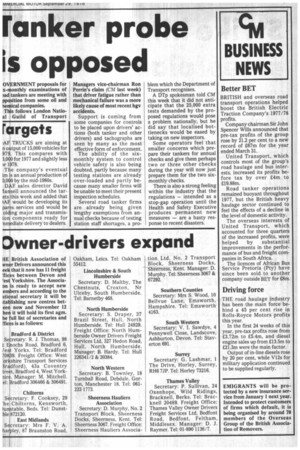anker probe opposed
Page 7

If you've noticed an error in this article please click here to report it so we can fix it.
RNMENT proposals for onthly examinations of )ad tankers are meeting with PP sition from some oil and ical companies.
s follows London Natioal Guild of Transport Managers vice-chairman Ron Perrin's claim (CM last week) that driver fatigue rather than mechanical failure was a more likely cause of most recent hgv accidents.
Support is coming from some companies for controls to be placed upon drivers' actions (both tanker and other drivers) and tachographs are seen by many as the most effective form of enforcement.
The ability of the sixmonthly system to control vehicle safety is also being doubted, partly because many testing stations are already over-loaded and partly because many smaller firms will be unable to meet their present inspection schedules.
Several road tanker firms are already being given lengthy exemptions from annual checks because of testing station staff shortages, a pro blem which the Department of Transport recognises.
A DTp spokesman told CM this week that it did not anticipate that the 25,000 extra tests demanded by the proposed regulations would pose a problem nationally, but he did say that localised bottlenecks would be eased by taking on new inspectors.
Some operators feel that smaller concerns which prepare their tankers for annual checks and give them perhaps two or three other checks during the year will now just prepare them for the two sixmonthly checks.
There is also a strong feeling within the industry that the regulations — intended as a stop-gap operation until the Health and Safety Executive produces permanent new measures — are a hasty response to recent disasters.
























































































































